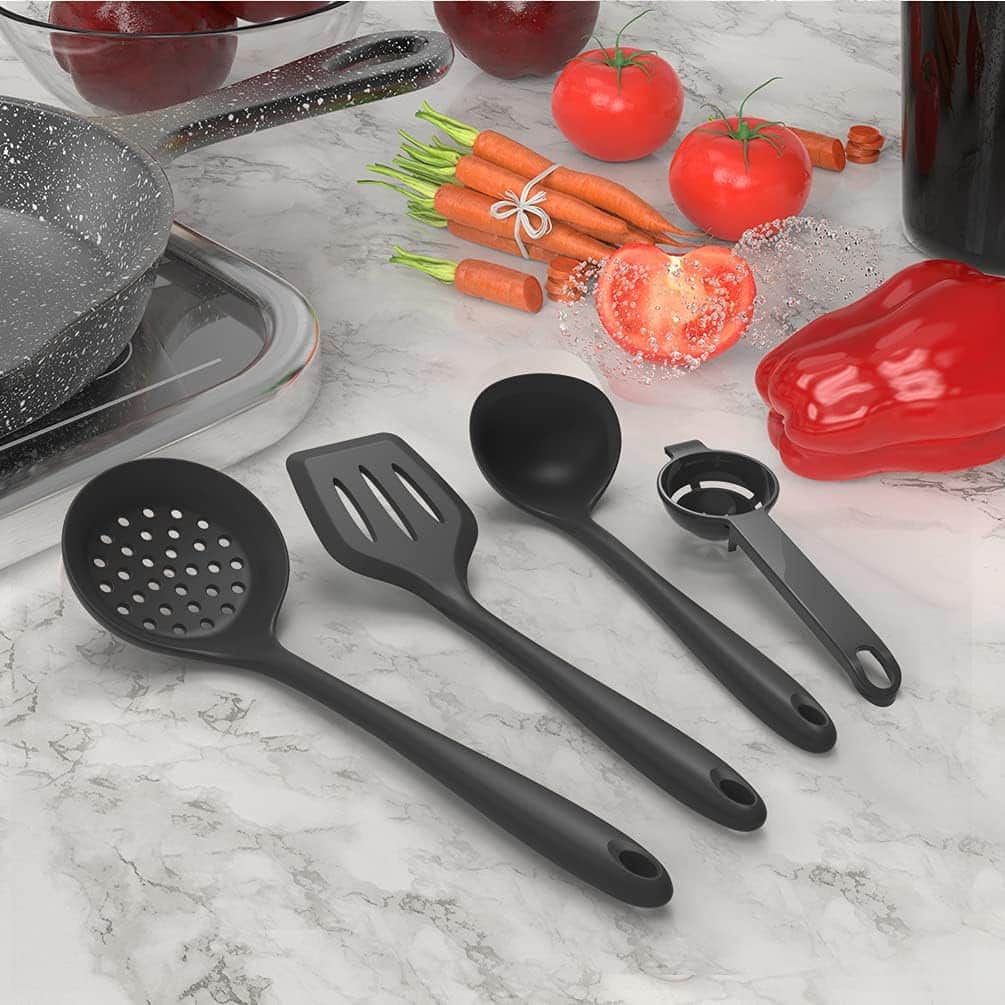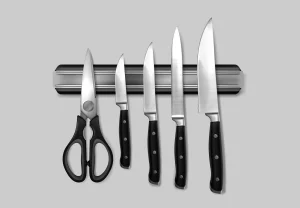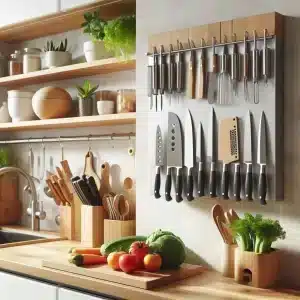Having a hard time deciding between silicone and nylon cookware? We know it’s hard to choose the right material when you have to consider safety, cookware compatibility, durability, cost and ease of cleaning.
In addition, you also have to take into account that every chef and housewife has their own preferences and styles in the kitchen. So it’s not always a simple decision.
That’s why we’ve put together this guide to help you understand the pros and cons of each material, along with some recommendations on the best cookware.
Silicone Cooking Utensils
Features
Silicone cooking utensils are made from a synthetic rubber-like material that is heat-resistant, flexible, and durable. They are safe to use on non-stick cookware and are often dishwasher-safe. Silicone utensils come in a variety of colors and designs, adding a modern touch to any kitchen.
- FDA Compliant: Silicone utensils meet the stringent safety standards set by the U.S. Food and Drug Administration, ensuring they are safe for food contact and won’t release harmful chemicals.
- BPA-free Silicone: These utensils are made without Bisphenol A (BPA), a chemical often found in plastics that can be harmful to health. BPA-free silicone ensures your cooking tools are safe for you and your family.
- 100% Pure Silicone: Pure silicone means there are no fillers or additives in the material, providing superior durability, flexibility, and safety when cooking at high temperatures.
Pros and Cons
Pros:
- Heat Resistance: Silicone can withstand high temperatures, typically up to 500°F (260°C), making it ideal for cooking at high heat.
- Non-reactive: Silicone doesn’t react with food or beverages, ensuring no unwanted flavors or chemicals are transferred.
- Gentle on Cookware: Silicone utensils won’t scratch or damage non-stick cookware or other delicate surfaces.
- Easy to Clean: Most silicone utensils are dishwasher-safe and resist stains and odors.
Cons:
- Flexibility: While this can be an advantage, overly flexible utensils may lack the rigidity needed for certain tasks.
- Cost: Silicone utensils can be more expensive compared to other materials.
- Durability: Over time, silicone can degrade and lose its shape or flexibility, especially with frequent use at high temperatures.
Best Silicone Kitchenware
- Silicone Spatula: Perfect for scraping bowls and spreading batters.
- Silicone Whisk: Ideal for mixing sauces and batters without scratching pots.
- Silicone Tongs: Great for gripping and turning food without damaging cookware.
- Silicone Baking Mats: A reusable alternative to parchment paper, ideal for baking cookies and pastries.
Nylon Cooking Utensils
Features
Nylon cooking utensils are made from a type of plastic that is heat-resistant, lightweight, and durable. They are popular for their affordability and are available in a wide range of styles and colors. Nylon utensils are safe to use on non-stick surfaces but can melt if exposed to very high temperatures.
Pros and Cons
Pros:
- Affordability: Nylon utensils are generally less expensive than their silicone counterparts.
- Durability: Nylon is strong and resistant to wear and tear, making it a good choice for everyday use.
- Variety: Available in numerous shapes, sizes, and colors to suit different kitchen styles and needs.
- Safe for Non-stick: Like silicone, nylon utensils won’t scratch non-stick cookware surfaces.
Cons:
- Heat Resistance: Nylon utensils typically withstand heat up to around 400°F (204°C), which is lower than silicone, posing a risk of melting if left in a hot pan.
- Chemical Release: When overheated, nylon can release harmful chemicals, which may be a health concern.
- Staining: Nylon can stain when exposed to certain foods, such as tomato sauce, and may retain odors.
Best Nylon Kitchenware
- Nylon Slotted Spoon: Ideal for straining and serving vegetables or pasta.
- Nylon Turner: Perfect for flipping pancakes, burgers, and more without damaging non-stick pans.
- Nylon Ladle: Useful for serving soups, stews, and sauces.
- Nylon Pasta Server: Designed for serving spaghetti and other pasta with ease.
Comparison Table
| Feature | Silicone Utensils | Nylon Utensils |
| Heat Resistance | Up to 500°F (260°C) | Up to 400°F (204°C) |
| Safety | FDA compliant, BPA-free, 100% pure silicone ensuring no harmful chemicals are released | Can release harmful chemicals when overheated |
| Durability | Durable but can degrade over time and lose flexibility | Strong and resistant to wear and tear |
| Compatibility | Safe for non-stick cookware, won’t scratch or damage delicate surfaces | Safe for non-stick cookware, won’t scratch |
| Cost | Generally more expensive | More affordable |
| Flexibility | Highly flexible, may lack rigidity for certain tasks | More rigid than silicone |
| Ease of Cleaning | Dishwasher-safe, resists stains and odors | Can stain with certain foods and retain odors |
| Appearance | Available in various colors and designs | Available in numerous shapes, sizes, and colors |
| Recommendations | – Silicone Spatula – Silicone Whisk – Silicone Tongs – Silicone Baking Mats | – Nylon Slotted Spoon – Nylon Turner – Nylon Ladle – Nylon Pasta Server |
Nylon or Silicone: Which One to Choose for Your Cookware?
When choosing between nylon and silicone cooking utensils, consider your cooking habits and preferences. If you frequently cook at high temperatures or need utensils that are highly flexible and non-reactive, silicone may be the better option despite the higher cost. However, if you prefer more affordable and sturdy utensils for everyday use, nylon might be the way to go.
Both materials are excellent choices for protecting your non-stick cookware and offer various benefits. Ultimately, the decision comes down to your specific needs, budget, and the types of dishes you prepare most often. Whether you choose nylon or silicone, both can enhance your cooking experience and help maintain your cookware’s longevity.





